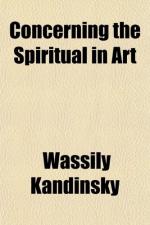At this point the individuality of the artist comes to the front and disposes, as he wills, these three elements. It is clear, therefore, that the choice of object (i.e. Of one of the elements in the harmony of form) must be decided only by A corresponding vibration in the human soul; and this is A third guiding principle of the inner need.
The more abstract is form, the more clear and direct is its appeal. In any composition the material side may be more or less omitted in proportion as the forms used are more or less material, and for them substituted pure abstractions, or largely dematerialized objects. The more an artist uses these abstracted forms, the deeper and more confidently will he advance into the kingdom of the abstract. And after him will follow the gazer at his pictures, who also will have gradually acquired a greater familiarity with the language of that kingdom.
Must we then abandon utterly all material objects and paint solely in abstractions? The problem of harmonizing the appeal of the material and the non-material shows us the answer to this question. As every word spoken rouses an inner vibration, so likewise does every object represented. To deprive oneself of this possibility is to limit one’s powers of expression. That is at any rate the case at present. But besides this answer to the question, there is another, and one which art can always employ to any question beginning with “must”: There is no “must” in art, because art is free.
With regard to the second problem of composition, the creation of the single elements which are to compose the whole, it must be remembered that the same form in the same circumstances will always have the same inner appeal. Only the circumstances are constantly varying. It results that: (1) The ideal harmony alters according to the relation to other forms of the form which causes it. (2) Even in similar relationship a slight approach to or withdrawal from other forms may affect the harmony. [Footnote: This is what is meant by “an appeal of motion.” For example, the appeal of an upright triangle is more steadfast and quiet than that of one set obliquely on its side.] Nothing is absolute. Form-composition rests on a relative basis, depending on (1) the alterations in the mutual relations of forms one to another, (2) alterations in each individual form, down to the very smallest. Every form is as sensitive as a puff of smoke, the slightest breath will alter it completely. This extreme mobility makes it easier to obtain similar harmonies from the use of different forms, than from a repetition of the same one; though of course an exact replica of a spiritual harmony can never be produced.




